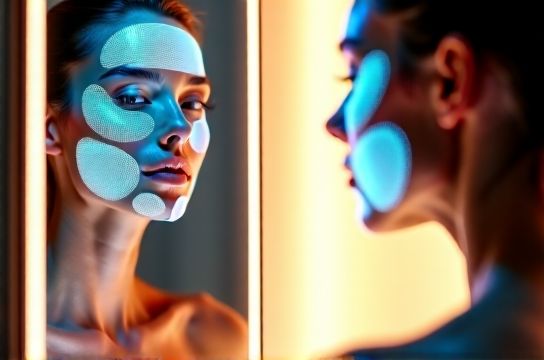Smart Mirror That Rates Your Facial Symmetry Daily
- 时间:
- 浏览:56
- 来源:OrientDeck
Ever looked in the mirror and wondered, "Do I look balanced today?" You're not alone. Enter the futuristic world of the smart mirror that rates your facial symmetry daily—a blend of AI, beauty tech, and self-awareness that's quietly revolutionizing morning routines.

These aren't your grandma's mirrors. Today’s smart mirrors use advanced facial recognition algorithms to scan, analyze, and even score your facial symmetry—often in under 10 seconds. Why does it matter? Because studies suggest that facial symmetry is subconsciously linked to perceptions of attractiveness, health, and even confidence.
How Does It Work?
Powered by machine learning and infrared sensors, these mirrors map over 68 key facial points—from the width of your eyes to the alignment of your jawline. The data is then compared to mathematical ideals of symmetry (like the golden ratio) and returns a daily "symmetry score"—think Fitbit, but for your face.
Some models, like the MirrorMate Pro or LumiFace AI, sync with apps to track trends over time. Noticed your left eyebrow drooping lately? Maybe it’s stress. A shifting jawline? Could be sleep posture. These insights help users adjust skincare routines, manage wellness, or even detect early signs of asymmetry-related issues like TMJ or Bell’s palsy.
Symmetry Scores: What’s Normal?
So, what’s a “good” score? Most systems rate symmetry on a scale from 0 to 100. Here’s a general benchmark:
| Symmetry Score | Interpretation | Population Percentile |
|---|---|---|
| 90–100 | Near-perfect balance | Top 5% |
| 75–89 | Highly symmetrical | Top 30% |
| 60–74 | Average symmetry | Middle 40% |
| Below 60 | Noticeable asymmetry | Bottom 25% |
Fun fact: The average daily fluctuation in symmetry scores is about 3–7 points, influenced by sleep, hydration, and even diet.
Real-World Impact & User Experience
Early adopters report more than just vanity metrics. Athletes use it to monitor inflammation; dermatologists recommend it for tracking post-acne healing; and mental wellness coaches say seeing incremental improvements boosts self-esteem.
"I didn’t think a mirror could make me feel more confident," says Mia T., a user from Austin. "But watching my symmetry improve after fixing my sleep schedule? That’s real feedback."
Criticism & Considerations
Of course, there are concerns. Could this fuel obsession or body dysmorphia? Experts advise using these tools mindfully—as health trackers, not beauty judges. Also, accuracy varies by brand. Cheaper models may misread lighting or angles, leading to false lows.
Still, the tech is evolving fast. Future versions may integrate hormone level predictions or skin elasticity analysis—all from your bathroom wall.
The Bottom Line
The smart mirror that rates your facial symmetry isn’t just a gimmick—it’s a glimpse into personalized, data-driven wellness. Whether you’re optimizing your glow-up or simply curious about your face’s daily story, this tech adds a new layer to self-care. Just remember: perfection isn’t the goal. Progress is.